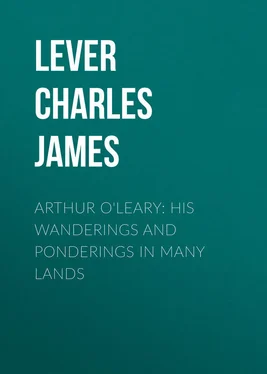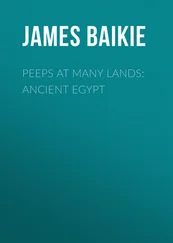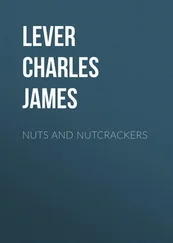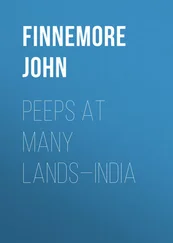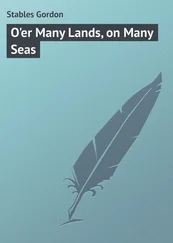Charles Lever - Arthur O'Leary - His Wanderings And Ponderings In Many Lands
Здесь есть возможность читать онлайн «Charles Lever - Arthur O'Leary - His Wanderings And Ponderings In Many Lands» — ознакомительный отрывок электронной книги совершенно бесплатно, а после прочтения отрывка купить полную версию. В некоторых случаях можно слушать аудио, скачать через торрент в формате fb2 и присутствует краткое содержание. Издательство: Иностранный паблик, Жанр: literature_19, foreign_antique, foreign_prose, на английском языке. Описание произведения, (предисловие) а так же отзывы посетителей доступны на портале библиотеки ЛибКат.
- Название:Arthur O'Leary: His Wanderings And Ponderings In Many Lands
- Автор:
- Издательство:Иностранный паблик
- Жанр:
- Год:неизвестен
- ISBN:нет данных
- Рейтинг книги:3 / 5. Голосов: 1
-
Избранное:Добавить в избранное
- Отзывы:
-
Ваша оценка:
- 60
- 1
- 2
- 3
- 4
- 5
Arthur O'Leary: His Wanderings And Ponderings In Many Lands: краткое содержание, описание и аннотация
Предлагаем к чтению аннотацию, описание, краткое содержание или предисловие (зависит от того, что написал сам автор книги «Arthur O'Leary: His Wanderings And Ponderings In Many Lands»). Если вы не нашли необходимую информацию о книге — напишите в комментариях, мы постараемся отыскать её.
Arthur O'Leary: His Wanderings And Ponderings In Many Lands — читать онлайн ознакомительный отрывок
Ниже представлен текст книги, разбитый по страницам. Система сохранения места последней прочитанной страницы, позволяет с удобством читать онлайн бесплатно книгу «Arthur O'Leary: His Wanderings And Ponderings In Many Lands», без необходимости каждый раз заново искать на чём Вы остановились. Поставьте закладку, и сможете в любой момент перейти на страницу, на которой закончили чтение.
Интервал:
Закладка:
Alas! the cabin has been crowded all the while by some fifty others, wrangling, scolding, laughing, joking, complaining, and threatening, and not a berth to be had.
“You’ve put me next the tiller,” said one; “I’m over the boiler,” screamed another.
“I have the pleasure of speaking to Sir Willoughby Steward,” said the captain, to a tall, gray-headed, soldier-like figure, with a closely-buttoned blue, frock. “Sir Willoughby, your berth is No. 8.”
“Eh! that’s the way they come it,” whispers a Cockney to his friend. “That ere chap gets a berth before us all.”
“I beg your pardon, sir,” says the baronet mildly, “I took mine three days ago.”
“Oh! I didn’t mean anything,” stammers out the other, and sneaks off.
“Laura-Mariar – where’s Laurar?” calls out a shrill voice from the aft-cabin.
“Here, Ma,” replies a pretty girl, who is arranging her ringlets at a glass, much to the satisfaction of a young fellow in a braided frock, that stands gazing at her in the mirror with something very like a smile on his lip.
There’s no mistaking that pair of dark-eyed fellows with aquiline noses and black ill-shaven beards – Hamburgh or Dutch Jews, dealers in smuggled lace, cigars, and Geneva watches, and occasionally small money-lenders. How they scan the company, as if calculating the profit they might turn them to! The very smile they wear seems to say, ‘ Comment c’est doux de tromper les Chrétiens .’ But, holloa! there was a splash! we are moving, and the river is now more amusing than the passengers.
I should like to see the man that ever saw London from the Thames; or any part of it, save the big dome of St. Paul’s, the top of the Monument, or the gable of the great black wharf inscribed with “Hodson’s Pale Ale.” What a devil of a row they do make. I thought we were into that fellow. See, here’s a wherry actually under our bow; where is she now? are they all lost already? No! there they go bobbing up and down, and looking after us, as if asking, why we didn’t sail over them. Ay! there comes an Indiaman, and that little black slug that ‘s towing her up against the stream, is one of the Tug Company’s craft; and see how all the others at anchor keep tossing and pitching about, as we pass by, like an awkward room full of company, rising at each new arrival.
There’s Greenwich! a fine thing Greenwich. I like the old fellows that the first lord always makes stand in front, without legs or arms; a cheery sight: and there’s a hulk, or an hospital ship, or something of that kind.
“That’s the Hexcellent,” saith a shrill voice behind me.
“Ah! I know her, she’s a revenue cruizer.”
Lord, what liars are the Cockneys! The plot thickens every moment; here come little bright green and gold things, shooting past, like dragon-flies skimming the water, steaming down to Gravesend. What a mob of parasols cover the deck, and what kissing of hands and waving of handkerchiefs to anonymous acquaintances nowhere. More steamers – here’s the “Boulogne boat,” followed by the Ostender, and there, rounding the reach, comes the Ramsgate; and a white funnel, they say, is the Cork packet; and yonder, with her steam escaping, is the Edinburgh, her deck crowded with soldiers.
“Port – port it is – steady there – steady.”
“Do you dine, sir!” quoth the steward to the pale gentleman. A faint “Yes,” “And the ladies too?” A more audible “No.”
“I say, steward,” cries Sir Peter, “what’s the hour for dinner?”
“Four o’clock, sir, after we pass Gravesend.”
“Bring me some brandy and water and a biscuit, then.”
“Lud, Pa!”
“To be sure, dear, we shall be sick in the pool. They say there’s a head wind.”
How crowded they are on the fore-part of the vessel! six carriages and eight horses; the latter belong to a Dutch dealer, who, by-the-by, seems a shrewd fellow, who, well knowing the extreme sympathy between horses and asses, leaves the care of his, to some Cockneys, who come down every half hour to look after the tarpaulins, inspect the coverings, see the knee-caps safe, find ask if they want “‘ay;” and all this, that to some others on board, they may appear as sporting characters, well versed in turf affairs, and quite up to stable management.
When the life and animation of the crowded river is passed, how vexatious it is to hear for the thousandth time the dissertation’s on English habits, customs, and constitution, delivered by some ill-informed, underbred fellow or other, to some eager German – a Frenchman happily is too self-sufficient ever to listen – who greedily swallows the farrago of absurdity, which, according to the politics of his informant, represents the nation in a plethora of prosperity, or the last stage of inevitable ruin. I scarcely know which I detest the more: the insane toryism of the one, is about as sickening as the rabid radicalism of the other. The absurd misapprehensions foreigners entertain about us, are, in nine cases out of ten, communicated by our own people; and in this way, I have always remarked a far greater degree of ignorance about England and the English, to prevail among those who have passed some weeks in the country, than, among such, as had never visited our shores. With the former the Thames Tunnel is our national boast; raw beef and boxing our national predilections; the public sale of our wives a national practice.
“But what’s this? our paddles are backed. Anything wrong, steward?”
“No, sir, only another passenger coming aboard.” “How they pull, and there’s a stiff sea tunning too. A queer figure that is in the stern sheets; what a beard he has!”
I had just time for the observation, when a tall, athletic man, wrapped in a wide blue cloak, sprang on the deck – his eyes were shaded by large green spectacles and the broad brim of a very projecting hat; a black beard, a rabbi might have envied, descended from his chin, and hung down upon his bosom; he chucked a crown-piece to the boatman as he leaned over the bulwark, and then turning to the steward, called out – “Eh, Jem! all right?”
“Yes, sir, all right,” said the man, touching his hat respectfully! The tall figure immediately disappeared down the companion-ladder, leaving me in the most puzzling state of doubt as to what manner of man he could possibly be. Had the problem been more easy of solution I should scarcely have resolved it when he again emerged – but how changed! The broad beaver had given place to a blue cloth foraging cap with a gold band around it; the beard had disappeared totally, and left no successor save a well-rounded chin; the spectacles also had vanished, and a pair of sharp, intelligent, grey eyes, with a most uncommon degree of knowingness in their expression, shone forth; and a thin and most accurately-curled moustache graced his upper lip and gave a character of Vandykism to his features, which were really handsome. In person he was some six feet two, gracefully but strongly built; his costume, without anything approaching conceit, was the perfection of fashionable attire – even to his gloves there was nothing which D’Orsay could have criticised; while his walk was the very type of that mode of progression which is only learned thoroughly by a daily stroll down St. James Street, and the frequent practice of passing to and from Crockford’s, at all hours of the day and night.
The expression of his features was something so striking, I cannot help noting it: there was a jauntiness, an ease, no smirking, half-bred, self-satisfied look, such as a London linendraper might wear on his trip to Margate; but a consummate sense of his own personal attractions and great natural advantages, had given a character to his features which seemed to say – it’s quite clear there’s no coming up to me ; don’t try it — nascitur non fit . His very voice implied it. The veriest commonplace fell from him with a look, a smile, a gesture, a something or other that made it tell; and men repeated his sayings without knowing, that his was a liquor, that was lost in decanting. The way he scanned the passengers, and it was done in a second, was the practised observance of one, who reads character at a glance. Over the Cockneys, and they were numerous, his eyes merely passed without bestowing any portion of attention; while to the lady part of the company his look was one of triumphant satisfaction, such as Louis XIV. might have bestowed when he gazed at the thousands in the garden of Versailles, and exclaimed, “ Oui! ces sont mes sujets .” Such was the Honourable Jack Smallbranes, younger son of a peer, ex-captain in the Life Guards, winner of the Derby, but now the cleared-out man of fashion flying to the Continent to escape from the Fleet, and cautiously coming aboard in disguise below Gravesend, to escape the bore of a bailiff, and what he called the horror of bills “detested.”
Читать дальшеИнтервал:
Закладка:
Похожие книги на «Arthur O'Leary: His Wanderings And Ponderings In Many Lands»
Представляем Вашему вниманию похожие книги на «Arthur O'Leary: His Wanderings And Ponderings In Many Lands» списком для выбора. Мы отобрали схожую по названию и смыслу литературу в надежде предоставить читателям больше вариантов отыскать новые, интересные, ещё непрочитанные произведения.
Обсуждение, отзывы о книге «Arthur O'Leary: His Wanderings And Ponderings In Many Lands» и просто собственные мнения читателей. Оставьте ваши комментарии, напишите, что Вы думаете о произведении, его смысле или главных героях. Укажите что конкретно понравилось, а что нет, и почему Вы так считаете.
